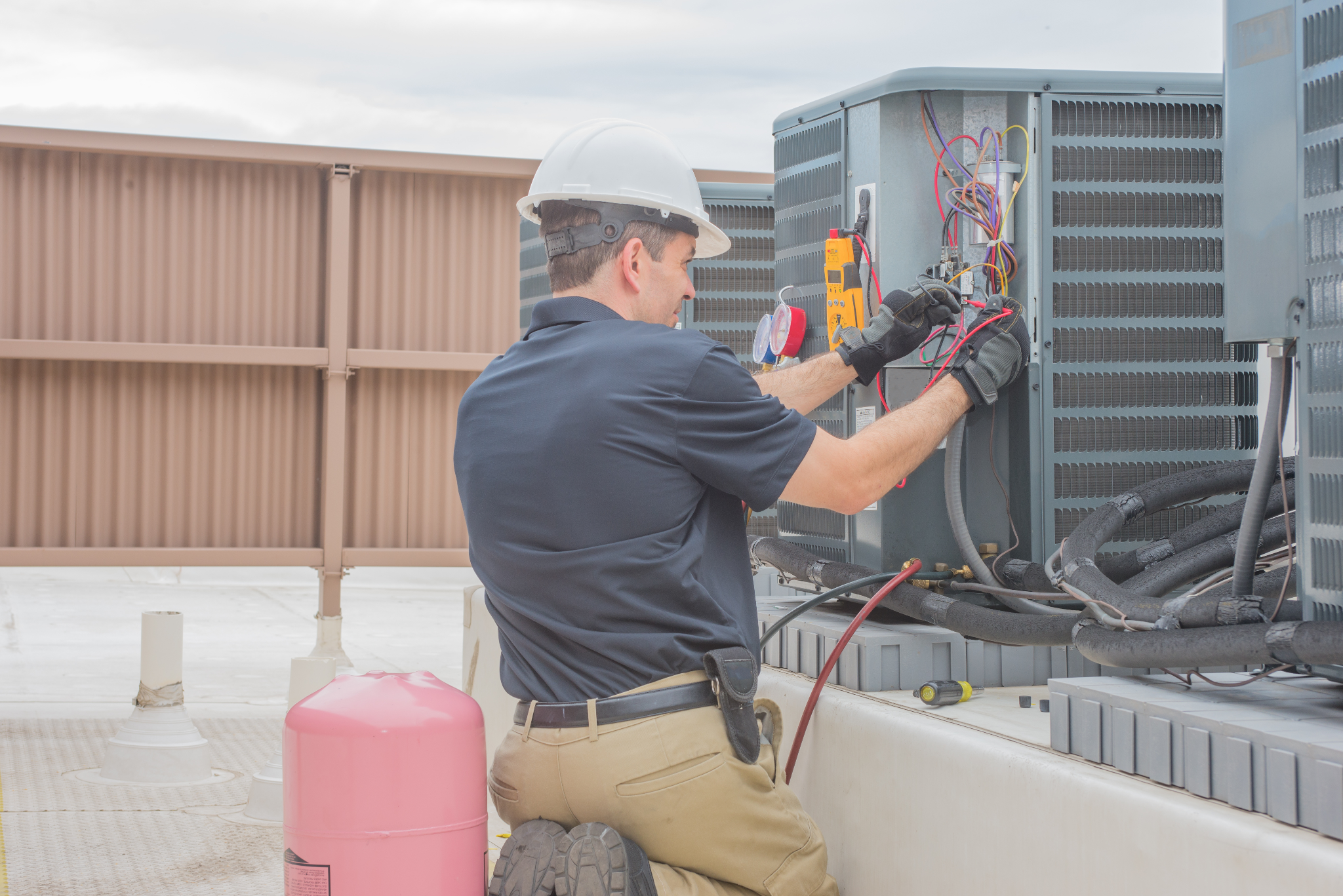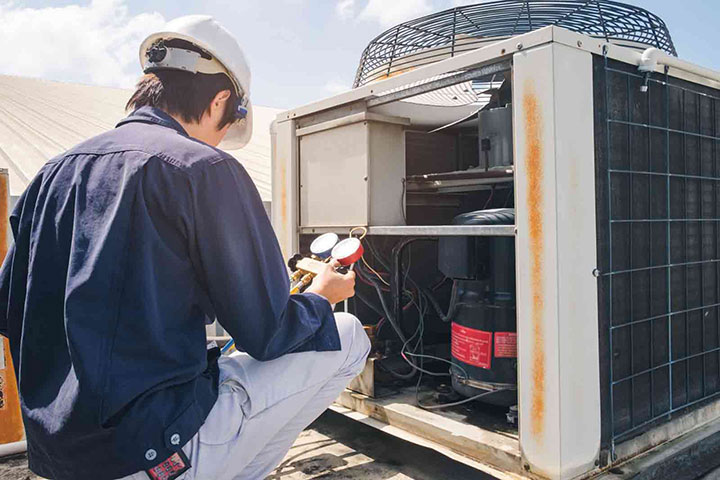Picking In Between a Warm Pump and Heater: Key Factors To Consider for Your Heating And Cooling Demands
When evaluating heating options for a/c requires, the decision in between a warm pump and a furnace can be intricate. Each system uses distinctive advantages customized to details climates and energy efficiency goals. Understanding these differences is essential for making an educated selection. Trick elements such as installation expenses and ecological effect additionally make complex the choice process. Which option absolutely straightens with one's convenience and sustainability preferences? The following sections will check out these considerations thoroughly.
Comprehending Warmth Pumps: Exactly How They Work and Their Benefits
While several homeowners take into consideration numerous heating choices, comprehending how heatpump function and their advantages can greatly influence their choice. Heatpump run by moving warmth rather than generating it. In the winter, they draw out warm from the outdoors air or ground and move it inside your home, while in the summertime, they reverse this procedure, cooling the home by eliminating warm outside. This dual performance makes them versatile for year-round climate control.One of the main advantages of heatpump is their energy performance. They utilize considerably less electrical energy contrasted to traditional heating unit, possibly leading to reduced energy bills (heat pump installation ooltewah tn). In addition, heatpump have a smaller sized carbon footprint, making them an eco-friendly choice. They additionally call for much less upkeep than conventional systems, adding to lasting expense financial savings. On the whole, recognizing the mechanics and advantages of heatpump can help home owners make informed choices regarding their heating and cooling down requirements
Exploring Furnaces: Kinds, Procedure, and Benefits
Heaters can be found in different kinds, consisting of gas, electrical, and oil models, each with distinctive operational devices. Understanding these differences is important, as they influence effectiveness and heating performance. In addition, furnaces use numerous advantages, such as consistent warm output and integrity in chillier climates.
Sorts of Heaters
Furnace can differ significantly in design and operation, with furnaces being a prominent selection amongst house owners. There are numerous sorts of heaters, each using various gas resources and modern technologies. Gas heating systems prevail, leveraging gas to produce warmth effectively. Electric heaters, on the other hand, make use of electrical resistance to produce heat, commonly preferred for their straightforward setup. Oil heaters, while much less common, are reliable in areas with limited gas gain access to (heat pump service). In addition, condensing heating systems make best use of energy effectiveness by recycling and recording exhaust gases. Each type runs with a system of warmth exchangers and ductwork to distribute warm air throughout a home. Understanding the distinctions in between these heater kinds is necessary for notified cooling and heating decisions
Benefits of Heaters
For homeowners looking for trustworthy heat throughout chilly months, the benefits of heaters are significant. Furnaces supply regular home heating, making sure even temperatures throughout the home. They are particularly efficient in extreme cold, typically outmatching warm pumps in icy conditions. Different kinds, including gas, electric, and oil heating systems, use flexibility to satisfy diverse requirements and preferences.Furnaces also often tend to have lower first installment expenses compared to warmth pumps, making them a more accessible option for lots of. Their durable style adds to a much longer life expectancy, with many systems lasting over 15 years with correct maintenance. Additionally, modern heaters are commonly equipped with advanced technology for boosted efficiency, which can lead to decreased power bills. In general, heating systems continue to be a trustworthy choice for efficient home heating.

Power Efficiency: Comparing Heat Pumps and Furnaces
When contrasting energy efficiency between heatpump and furnaces, the Seasonal Power Efficiency Proportion (SEER) plays a crucial role in determining efficiency. Furthermore, a functional expense evaluation reveals the lasting economic ramifications of each system. Recognizing these elements can guide property owners in making informed choices regarding their heating options.
Seasonal Power Effectiveness Ratio
Energy effectiveness plays an essential role in the decision-making process between heatpump and heating systems, particularly when thinking about the Seasonal Power Effectiveness Ratio (SEER) This statistics procedures the cooling efficiency of heat pumps over an entire cooling period, supplying a standard way to examine performance. Greater SEER scores suggest better energy effectiveness, translating to lower energy intake and lowered utility costs. On the other hand, heating systems are normally examined using the Yearly Fuel Use Efficiency (AFUE) rating, which reflects heating efficiency. When comparing these 2 systems, property owners ought to focus on SEER rankings for heat pumps, as they straight effect general energy cost savings and environmental sustainability. A complete understanding of SEER can significantly influence the long-lasting satisfaction and cost-effectiveness of the chosen a/c remedy.
Operational Cost Evaluation
Understanding the functional expenses linked with heatpump and heaters is important for homeowners examining their options. Warmth pumps usually supply higher energy efficiency, transforming electrical power into heat with minimal waste. This causes reduced regular monthly energy expenses, particularly in modest environments. Alternatively, traditional heaters, specifically gas versions, may have reduced in advance costs however can incur greater functional expenditures with time as a result of fuel costs and effectiveness ratings.Moreover, heat pumps can function as both heating and cooling down systems, possibly decreasing the requirement for different a/c systems. While initial financial investments for heatpump might be higher, their long-term savings in power performance can make them a much more affordable option for numerous houses. Cautious analysis of local energy prices is necessary to figure out the very best option.
Setup Costs: What to Anticipate for every Heating Unit
Installation costs for heating systems can differ substantially between warm pumps and furnaces, influencing homeowners' decisions. Warmth pumps typically have greater upfront setup expenses, generally varying from $3,500 to $8,000, depending upon the device dimension and complexity of setup. This includes the exterior system, indoor handling system, and essential ductwork adjustments. Conversely, heaters have a tendency to have reduced preliminary prices, balancing in between $2,500 and $6,000, which can be appealing for budget-conscious homeowners. Nevertheless, installment expenses can enhance if comprehensive ductwork is required.Moreover, the option of gas kind for furnaces-- gas, lp, or electrical-- can also influence installation prices. While heat pumps supply energy efficiency, their first financial investment may prevent some customers. Eventually, reviewing installation costs together with lasting financial savings and performance will assist home owners in making educated choices regarding their heater.
Environment Considerations: Which System Executes Much Better in Your Area
Exactly how do climate problems influence the performance of home heating systems? The performance of warmth pumps and heating systems can differ considerably depending on the local environment. In modest environments, heatpump stand out by effectively transferring warmth from the outside air, making them an energy-saving choice. Their efficiency lessens in very cold temperature levels, where they may struggle to extract adequate warmth. Alternatively, heating systems, especially gas versions, give trustworthy and constant warmth no matter outside problems, making them more suitable in chillier regions.In locations that experience milder winters, heatpump can operate successfully year-round, providing both heating & cooling. On the other hand, regions with severe wintertimes frequently gain from the toughness of furnaces. Eventually, understanding the neighborhood climate is necessary when deciding between a heatpump and a furnace, as it straight impacts their operational effectiveness and overall performance.
Maintenance Needs: Long-Term Look After Warm Pumps vs. Furnaces
While both warmth pumps and heating systems call for routine maintenance to guarantee peak efficiency, their certain needs and treatment routines differ considerably. Heaters commonly need much less constant attention, with yearly examinations being sufficient to look for gas leaks, clean filters, and examine overall capability. Their simpler style often permits uncomplicated repairs.In comparison, heatpump necessitate biannual maintenance because of their twin function in cooling and heating. This includes cleansing coils, checking refrigerant levels, and guaranteeing that both the outdoor and interior systems operate at Visit Your URL their finest. In addition, heatpump maintenance frequently involves more complex elements, making professional maintenance essential.Neglecting upkeep can bring about decreased performance and boosted power costs for both systems. Inevitably, property owners ought to think about these long-term care demands when selecting between a heatpump and a heating system, as proactive maintenance can extend the lifespan and performance of either system significantly.
Environmental Impact: Selecting a Sustainable Home Heating Option
The ecological effect of heater is a vital examination for property owners looking for lasting choices. Heatpump are usually more energy-efficient than typical furnaces, as they transfer warm instead than create it, significantly decreasing carbon exhausts. By making use of eco-friendly energy resources, such as geothermal or air-source heatpump, house owners can even more reduce their eco-friendly footprint.On the other hand, natural gas heating systems emit greenhouse gases and contribute to air pollution, though they usually offer greater warmth outcome. Developments in innovation have actually led to the development of high-efficiency heating systems that reduce emissions.Ultimately, selecting a home heating system includes considering efficiency against environmental impact. Home owners are motivated to assess neighborhood energy resources and incentives for eco-friendly systems, ensuring an option that straightens with both personal comfort and ecological obligation. The decision affects not only instant comfort but also long-term sustainability and ecological health.
Often Asked Questions
For How Long Do Heat Pumps and Furnaces Typically Last?
The life-span of heatpump normally ranges from 15 to twenty years, while furnaces can last in between 15 to three decades. Routine maintenance considerably influences their long life and performance in offering heating options.
Can I Use a Heatpump in Incredibly Cold Climates?
Warm pumps can operate in extremely cold climates, yet their efficiency diminishes as temperatures decrease. In such problems, supplemental home heating resources may be essential to keep comfortable interior temperature levels and guarantee peak efficiency.

What Is the Noise Degree of Heat Pumps Versus Furnaces?
The sound levels of heatpump and heaters vary substantially. Normally, warmth pumps operate even more silently than typical heaters, making them preferable for those delicate to sound, while furnaces might create louder operational sounds throughout home heating cycles.
Are Warm Pumps Suitable for Both Cooling And Heating?
Heatpump are indeed ideal for both Read More Here home heating and air conditioning (ductless mini splits). They work by transferring heat, offering effective temperature level control year-round, making them a flexible option for property owners seeking an all-in-one a/c solution
What Size Heating Unit Do I Required for My Home?
Determining the proper size heating unit for a home requires reviewing aspects such as square video footage, insulation quality, local environment, and the home's layout. Consulting a professional can ensure an exact assessment and optimal convenience. Warmth pumps commonly offer greater energy effectiveness, converting electrical power right into heat with marginal waste. In moderate environments, warm pumps succeed by efficiently transferring warmth from the outdoors air, making them an energy-saving choice. Conversely, heaters, especially gas designs, give reliable and regular warm regardless of outdoor conditions, making them more effective in cooler regions.In locations that experience milder wintertimes, warm pumps can operate efficiently year-round, offering both heating and air conditioning. Warm pumps are generally more energy-efficient than typical heaters, as they move warm rather than create it, substantially reducing carbon discharges. By utilizing eco-friendly energy sources, such as geothermal or air-source warmth pumps, homeowners can better minimize their ecological footprint.On the other hand, natural gas heaters give off greenhouse gases and contribute to air contamination, though they frequently give advice greater heat result.